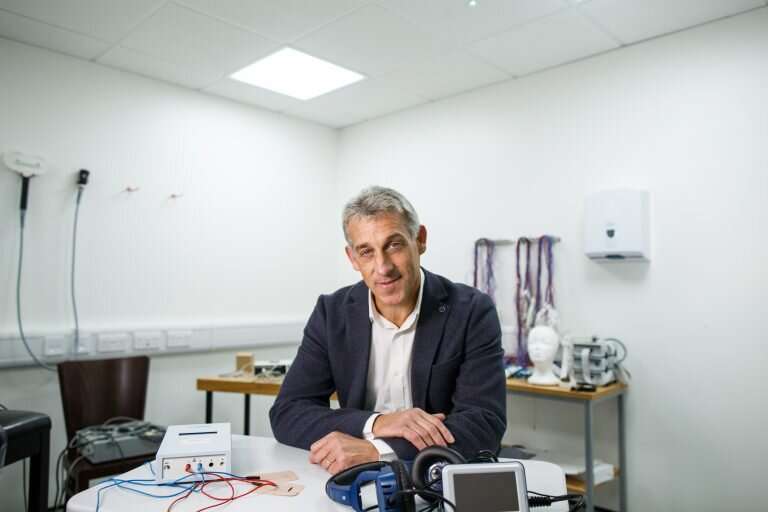Using stimulation of the balance organs in the ear as a Parkinson's treatment

Some of the most troubling features of Parkinson's disease can be reduced by gentle stimulation of the balance organs via the application of electric or thermal currents to nearby parts of the head. This observation, made by Professor David Wilkinson at the University's School of Psychology, follows from the results of his recent clinical trial in which this non-invasive method of brain stimulation was associated with significant and lasting improvements in quality of life and functional independence.
For World Parkinson's Day (11 April 2022), Professor Wilkinson, explains how non-drug therapies for Parkinson's Disease are providing significant impact:
"Cocooned deep inside the inner ear, tightly encased by one of the strongest bones in the body, lie the balance organs. These tiny organs detect minute movements of the head and in doing so tell us which way is up, whether we are moving and, if so, in what direction.
"Our sense of balance is usually silent and overshadowed by the rich experiences conveyed by our other five senses. But as anyone who has experienced severe vertigo or dizziness knows, our sense of balance is central to well-being and mental capacity. In fact, scientific study shows that the areas of brain involved in movement, thought, emotion and sleep all rely on information from the balance system. This tells us that the balance system not only keeps us upright but also contributes to general brain function. The intriguing possibility therefore arises that the balance system may provide a route through which we can tackle brain disorders such as Parkinson's disease which can present with many different symptoms.
"The balance organ research we are carrying out at the University of Kent demonstrates that mobility, cognition and mood can all be boosted among those with Parkinson's Disease, with gentle, daily stimulation. The stimulation techniques are applied via portable devices that are suitable for home use and are well-tolerated by those who use them.
"Although early stage and in need of replication, no other Parkinson's therapy has yet demonstrated the same durable and diverse pattern of gain seen with this non-invasive method of brain stimulation. In fact, very few neurological medicines continue to work so effectively once withdrawn, not least those that do not involve drugs.
"The powerful influence of the balance organs on brain health perhaps explains why nature has chosen to bury them so deep inside the head and out of harm's way. As we mark World Parkinson's Day, it is encouraging to see medical science harnessing this power in pursuit of a better quality of life for the increasing number of people who live with the condition."
Professor David Wilkinson is leading the launch of the Parkinson's Center for Integrated Therapy, a new partnership between the University of Kent and national charity Parkinson's Care and Support UK. The Parkinson's Center for Integrated Therapy will offer innovative forms of neurostimulation along with tailored access to long-standing, but often hard to reach non-drug therapies such as physiotherapy and psychotherapy.
The Center will fill a much-needed gap in the support and management of people with Parkinson's disease and their families and will host cutting-edge research and education to carry the very best care into the future.
More information: David Wilkinson, Caloric and galvanic vestibular stimulation for the treatment of Parkinson's disease: rationale and prospects, Expert Review of Medical Devices (2021). DOI: 10.1080/17434440.2021.1935874
David Wilkinson et al, Caloric vestibular stimulation for the management of motor and non-motor symptoms in Parkinson's disease, Parkinsonism & Related Disorders (2019). DOI: 10.1016/j.parkreldis.2019.05.031
David Wilkinson et al, A durable gain in motor and non-motor symptoms of Parkinson's Disease following repeated caloric vestibular stimulation: A single-case study, NeuroRehabilitation (2016). DOI: 10.3233/NRE-161308

















